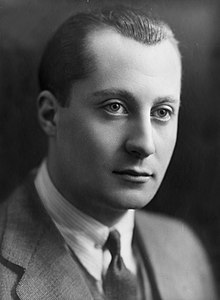José Antonio Primo de Rivera
José Antonio Primo de Rivera (born April 24, 1903 in Madrid , † November 20, 1936 in Alicante ) was a Spanish fascist politician and from 1933 to 1936 party leader of the Falange .
Life
José Antonio Primo de Rivera was a son of the general and dictator Miguel Primo de Rivera , who ruled Spain from 1923 to 1930.
He studied law at the University of Madrid , became a lawyer and wrote for the newspapers El Fascio and ABC . He tried hard to defend his father's legacy, and so on May 2, 1930, he accepted the post of Vice-Secretary of the Unión Monárquica from Alfonso Sala Argemí . In the 1931 elections, however, he was beaten by his conservative opponent Bartolomé Cossío .
In 1932 he took part in General José Sanjurjo's military coup and was arrested as a result. Shortly thereafter, he and Julio Ruiz de Alda founded the Movimiento Sindicalista Español , the predecessor organization of the Falange . On October 29, 1933, Primo de Rivera founded the fascist Falange together with the pilot Julio Ruiz de Alda and the writer Alfonso García Valdecasas in Madrid, whose hymn Cara al Sol he himself composed with a collective of authors. In 1934, his party joined forces with the Juntas de Ofensiva Nacional Sindicalista and then called itself, under his leadership, Falange Española de las Juntas de Ofensiva Nacional-Sindicalista . In the 1936 elections, the Falange only won 0.7% of the vote. After the victory of the left, the party grew rapidly and by June 1936 already had 40,000 members. After the attempted murder of right-wing students of the SEU (Sindicato Español Universitario) of Jiménez de Asúa , his party was banned.
death
He was arrested on June 6, 1936 for possession of a firearm and first imprisoned in Modelo near Madrid with other members of the party. From his cell, however, he continued to lead the party and supported the military coup in July 1936 against the Second Spanish Republic . He was moved to Alicante. As early as July 1936, Primo de Rivera publicly declared that he supported the rebelling generals under Emilio Mola . At the trial in Alicante he took on his own defense as well as that of his brother Miguel and his wife. On November 17, 1936, José Antonio was sentenced to death for the military revolt and executed on November 20, 1936.
Significance for the Franco regime
In 1937 the Caudillo and Generalissimo Francisco Franco dissolved the Falange in association with other groups to form the new state party FET y de las JONS .
Franco created a personality cult around Primo de Rivera. After his arrest, the Falangists called him "El Ausente" (the absent one). This should highlight his importance as a leader of the nationalist forces. After he was shot, he was also called "Martyr of the Crusade".
During the Franco era, a memorial plaque was erected in every village for the fallen nationalist soldiers, with the inscription " Caídos por Dios y por España " (German: "Fallen for God and Spain"). Primo de Rivera's name was listed first on each tablet.
After the civil war, Franco had the Valle de los Caídos memorial built in the Sierra de Guadarrama (Madrid) for the fallen of the regime and to glorify the Falange, where José Antonio Primo de Rivera was buried in 1959.
November 20th (" 20-N ") is still a symbolic date for the Spanish right. The last statue of Primo de Rivera was removed in Guadalajara in March 2005 at the urging of the government under José Luis Rodríguez Zapatero ( Spanish Socialist Workers Party ).
Primo de Rivera's sister Pilar Primo de Rivera founded the Sección Femenina , the women's section of the Falange. The Sección Femenina stated that its goal was to educate Spanish women in terms of “basic social values”.
literature
- Bernd Nellessen (Ed.): José Antonio Primo de Rivera. The troubadour of the Spanish Falange. Selection and commentary on his speeches and writings Deutsche Verlags-Anstalt, Stuttgart 1965.
- Stanley G. Payne : Fascism in Spain 1923-1977 . The University of Wisconsin Press, Madison WI 1999.
- Juan Velarde Fuertes: José Antonio y la economía. Grafite ediciones, ISBN 84-96281-10-8 .
- Jose Maria Thomas: Jose Antonio Primo de Rivera. The Reality and Myth of a Spanish Fascist Leader , Oxford: Berghahn 2019 (Studies in Latin American and Spanish History; 3), ISBN 978-1-78920-208-3 .
Web links
- Literature by and about José Antonio Primo de Rivera. Ibero-American Institute Berlin
- Literature by and about José Antonio Primo de Rivera in the catalog of the German National Library
- Newspaper article about José Antonio Primo de Rivera in the 20th century press kit of the ZBW - Leibniz Information Center for Economics .
- Ángel Luis Sánchez Marín: book. (Spanish)
- Current text about the Franco period (Spanish)
| personal data | |
|---|---|
| SURNAME | Primo de Rivera, José Antonio |
| BRIEF DESCRIPTION | Spanish politician |
| DATE OF BIRTH | April 24, 1903 |
| PLACE OF BIRTH | Madrid , Spain |
| DATE OF DEATH | November 20, 1936 |
| Place of death | Alicante , Spain |
